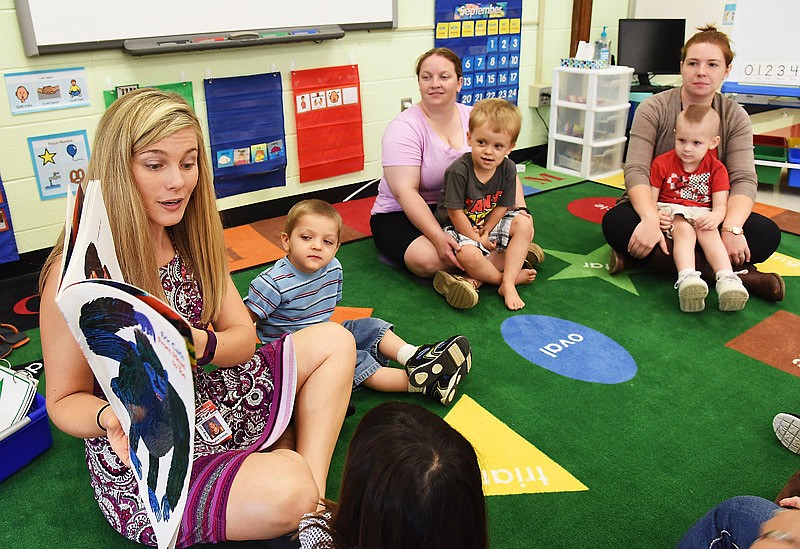The 3- and 4-year-old students arched their backs like kittens, wriggled their hips like crocodiles and kicked their legs like donkeys during the interactive story time.
For the students, the activity is just a fun way to connect to the text, but they're also practicing motor skills, listening and following directions, and understanding the story carries a message.
The early childhood special education program at Southern Boone School District caters to children ages 3-5. It gives students with various cognitive delays a head start on academic learning and improving social and emotional skills, while overcoming any struggles they have before entering kindergarten, said Breena Eddy, assistant director of special services and early childhood.
For several years, Southern Boone students were bused to the Special Learning Center in Jefferson City. However, as the district's enrollment grew, it didn't make sense to continue sending students out of town for services, she said.
It's the first year the district has its own program, and it's currently serving 12 students split into two classes, one in the morning and one in the afternoon, for the entire year. Students go through an evaluation process before being admitted and have a range of disabilities.
Some of the students have minor delays that can be overcome during the program - those students might not need additional attention once they reach kindergarten, said Safire Ortbals, early childhood special education teacher for the program. For other students, it's an opportunity to get an edge on overcoming their hurdles before beginning kindergarten.
"It's pretty powerful. The brain is incredible," Ortbals said. "We know there are optimal times for children to learn certain things. For students with delays, if you can start early and build pathways and fill gaps in the brain, then they may not need additional help in kindergarten. If you wait until kindergarten, it takes a lot more resources, a lot more ties to fill some of those gaps. When you start early, it can be a quicker process."
Before the school year starts, she met with parents to identify what each child needs to work on, so the plans are individualized, she said.
A lot of the curriculum is based around literacy. Ortbals uses a book as a launching point and selects books tailored for their age group or are developmentally targeted for their delays. The book becomes the central theme for a couple weeks, with sensory, motor or language skills activities built around that theme.
Last week, they read "From Head to Toe" by Eric Carle.
Every page shows an animal and a movement the animal does and asks the students, "Can you (do that)?" The activities get them to move around, which is great for motor skill enhancement, following directions and being aware of other people's personal space. Afterward, they searched for hidden animal figurines in a large barrel of corn kernels, which exercises their fine motor skills and activates their senses.
Each week, physical, speech and occupational therapists join the class to work with the students on areas they need improvement. The classroom space is flexible, with room for the therapists to work one on one with students who need extra attention.
They also work on foundational skills, including colors, numbers, counting and the alphabet.
The program just wrapped up its first week of classes so the students have spent some of their time becoming familiar with the classroom and getting used to the schedule.
"I'm super excited to get to start this program," Ortbals said. "I think it's been a huge need, and we love that we have our hands on these kids and eyes on these kids. We're getting to know them so when they transition to kindergarten, it's so much easier. The kindergarten teacher isn't starting from ground zero, and the special education teacher isn't starting from ground zero."

